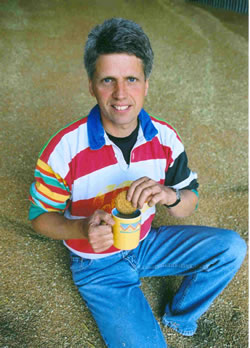
Picture: Geert Willemsen, who has grown Claire for the past six years at his farm at Glemsford, near Bury St Edmunds
Many farmers will stick with Claire for the bulk of their crop due to its solid performance over the past year, believes Bill Angus, senior wheat breeder at Nickerson.
"Claire has performed well in both NIAB and ARC trials," explains Mr Angus. "And more importantly, farmers find the variety easy to grow and easy to sell. I have been getting a lot of positive comments about Claire from growers this year."
One of these is Suffolk farmer Geert Willemsen, who has grown Claire for the past six years at his farm at Glemsford, near Bury St Edmunds.
"Claire is reliable in all conditions, and usually yields around the 11t/ha (4.5t/acre) mark – sometimes more, sometimes a little less," says Mr Willemsen "It is cheap to grow and has never been a disaster. What's more the quality is always good, and the local mills are keen to buy it. If you grow something the customers like and trust you can't go far wrong - so why change?"
Claire tillers well and has a strong rooting structure therefore suits the min-till system that Mr Willemsen practices. This autumn, 81ha (200acres) of Claire will be drilled on the farm.
Grower Basil Golding, who farms 470ha (1150acres) at Tolleshunt d'Arcy, near Maldon in Essex, also favours Claire for its consistent yield and good disease resistance.
"Our land lies beside the Blackwater estuary which makes it prone to disease. This means I need a robust variety that can stand up to attack without spending a huge amount on inputs. Claire's resistance to Septoria has been particularly useful this year." He adds: "Claire's quality holds up very well, and being near the East coast ports there is a good local market. Most of ours goes for export."
Mr Golding grows a wide range of crops including wheat and oilseed rape, herbage seed, borage and echium. He drills mainly first wheats, and Claire fits well into the rotation. He will be growing 57ha (140acres) of Claire next year.
Bill Angus concludes: "Claire tolerated the hot weather well and was less affected by the late attack of Septoria because of its resistance to this disease. There is no doubt that Claire has had a good year, and is likely to be the UK's most widely sown variety this autumn once again."
